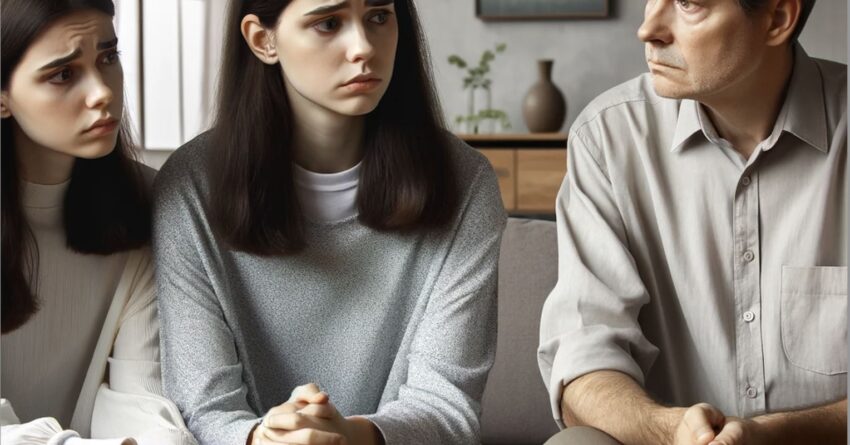This post is the second in a series about the experiences, feelings, and healing journey of two sisters who are adult children of gray divorce.
Since 1990, a worldwide phenomenon has been occurring. The divorce rate of adults over 50 has doubled, and researchers predict it will triple by 2030. Yet most people don’t know it has been happening or how it impacts family members. Researchers named this phenomenon “The Gray Divorce Revolution.” The adult children of these divorcing couples frequently say they feel painfully alone and unprepared to handle what is happening in their family, and no one understands what they are experiencing. They are in shock and feel overwhelmed.

Two adult sisters, angry and worried, discuss their parents’ painful separation and divorce.
Source: DALL-E / OpenAI
I recently spoke with two German sisters, Sophia and Eleana (not my patients), who were adults when their parents began their gray divorce journey. Eleana is a 30-year-old talent management/development expert and a career coach living in Germany, and Sophia is a 27-year-old journalist based in the United Kingdom.
Carol: How old were you and your parents when you found out they were separating?
Sophia: I was 20 years old and in my second year at university in Amsterdam. So, I was coming in and out of the family home. My older sister, Eleana, was about to head to Germany for her first corporate job after college. Our 17-year-old sister was living at home in Malaysia, finishing her last year of high school. Our parents were in their late 40s when the separation began. It was a seven-to-eight-year process until they decided to separate officially. So, by then, they were in their late 50s.
CH: What was your role during this time, Sophia?
S: First, I want to say that my mother, younger sister, and I leaned heavily on Eleana, probably because she was the oldest. Whenever Eleana confronted our father about the affair and leaving our mother, he would end the conversation. Then, the three of us would call Eleana and say, “Can you please make up with him? We want to make sure he is not going to leave yet.” Telling Eleana to stop being confrontational is the perfect example of how I behaved then.
I’m a big people pleaser, so, initially, I felt the need to make everyone, including my father, happy. So, I would go out of my way to try to fix the situation and tell our dad that we were there for him, the door was open, and if he ever wanted to come back, he could. So, when Eleana had her moments where she burst, I thought, “No, this is not going according to plan. We need to be with him.” I had a constant need to control the situation and to get our dad back. Our father liked sunflowers, so I constantly sent him sunflowers and told him we loved him. But I quickly realized that I had no control over where this relationship was going.
CH: What were you feeling when you were in the people-pleaser role?
S: It was a very helpless feeling. You’re helpless in the situation. You’re looking at it from the outside, and you want to make things better, but you can’t. This is something that I learned to fight over the years and to deal with because, at the end of the day, this is not my marriage. It’s the marriage of two people I love. But, yeah, I cannot control that, and, unfortunately, I can’t make everyone happy. And that’s something that I definitely learned over the last few years.
CH: Eleana, what other thoughts do you have about the roles you and Sophia took on?
Eleana: I think it’s so interesting because we’ve spoken so much about the roles and what that even means in a family as a result of this situation. We definitely took on roles at the beginning of the separation as a means of control. And you mentioned that yours was a means of control. The way that I acted also was a means of control. We both were trying to control things in our way, and what both of us have noticed now, eight years on, is actually there are no more roles because that core family doesn’t exist anymore. So, the roles we now have are more in our individual relationships with one another.
I think for me that really formed in what we like to call the limbo phase that our parents went through, where after a year or two of separation, our father actually came back to our mother, and they decided to try to work on things to see if they could stay together. And there was a long back and forth reconciling, fighting, being together, and not being together. I think, Sophia, that was harder for you at that time than for me because, at that time, I just started saying, “Nope, I can’t deal with this at the moment.” So maybe you can talk a little bit about how that limbo phase affected you.
S: Oh, yeah, the dreaded limbo phase. It affected me big time. I think because we are adult children of divorce, our life was on full display. There was no hiding from it. And we were very much involved and aware of everything that was going on. There were times when we even went on holidays together as a family again, and you never know, is it going to be a good holiday? Is it going to be a bad holiday? And it was all very dependent on what their relationship was like. For me, just this ongoing process generated this hope in me, kind of connecting again to my earlier feelings of the hope that we would be a family again or that our dad would come back. I really clung to that.
And, yes, because you’re in this limbo phase, you don’t ever get closure, or you don’t ever get a clear answer to be able to move forward personally. And that is very emotionally taxing, exhausting, and really difficult. So, yes, the limbo phase had a really big impact on me to the point where the moment when three years ago, they officially announced their separation, there was a profound feeling of sadness. Still, there was also a feeling of relief because it was like, thank God they finally made up their minds. It’s over.
CH: Seven years after the start of your parents’ separation, you became the creators and producers of the podcast “The Kids Are Not Alright!” Why did you decide to do this?
S: We wanted to start sharing what we experienced during our parent’s separation and the context of what it meant for us and continues to mean for us even today. Our goal is for the podcast to be a support for other adult children of divorcing or divorced parents because we did not know how to deal with our parents’ separation and divorce. We felt very alone, in shock, unsupported, and overwhelmed. We did not know how to handle what was happening and what we were feeling and experiencing. We want other adult children to know they are not alone and to share with them what has helped us heal over the years. We hope that will help them heal, too.
Read the previous post here.
© 2024 Carol R. Hughes, Ph.D.
